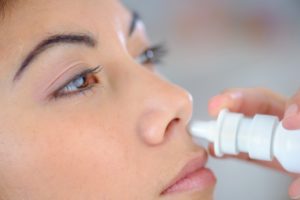Whether you are recovering from a cold, suffer from an illness, are aging, or are taking certain medications, you may be experiencing anosmia or a loss in sense of smell. You are likely having a hard time going about everyday life. Your sense of smell is directly related to your sense of taste, which means that you probably can’t enjoy foods like you used to. Keep reading to learn how you can regain sense of smell.
You may also be unable to enjoy your favorite smells like the scent of freshly brewed coffee, your favorite perfume or cologne, or the earthy smell of rain. Losing your sense of smell can have a significant impact on your life, from preventing you from smelling a carton of milk to see if it’s spoiled to causing you the inability to smell a fire or gas leak.
 Regain Your Sense of Smell
Regain Your Sense of Smell
There are many things you can do to regain your sense of smell. From trying things at home to seeking the help of a doctor, you can restore your sense of smell to what it was before you lost it. Below are 3 ways to help you regain your sense of smell:
-
Clean the Inside of Your Nose
If your anosmia is caused by an infection or environmental allergies, rinsing the inside of your nose with a saltwater solution may help bring back your sense of smell. The various viruses that cause the common cold and flu
damage and interfere with the olfactory epithelium. The olfactory epithelium is the layer of mucous membrane at the very top of the nasal cavity. This layer contains olfactory receptor cells, which contribute to your sense of smell. Once the virus has run its course and some symptoms have disappeared, you may still experience anosmia. Allergies can also cause your nasal passages to swell and become inflamed. Nose cleaning can help reduce this swelling and inflammation, which can help you regain your sense of smell.
To make a saltwater solution:
- Boil a pint of water and allow it to cool for 10-15 minutes.
- Add a teaspoon of salt and a teaspoon of baking soda to the water. Then, mix until dissolved.
- Wash your hands thoroughly with soap and warm water.
- Ideally, you want to use a sinus rinse bottle to squeeze the solution into one nostril at a time.
- Repeat these steps a few times to see if it helps restore your sense of smell.
Note: Make a fresh batch of the solution for each use. Never use any leftover solution from the day before.
-
Consider Over-the-Counter Medications/Prescription Medication

- Nasal decongestant: Decongestants cause blood vessels in the nasal passages to shrink, which reduces nasal congestion. This prevents cuts down on fluid buildup in your nose. Nasal decongestants can open up your nasal passages and make you breathe easier as well as improve your sense of smell. They are available in the form of sprays, drops, and inhalers.
- Antihistamine: Antihistamines can relieve nasal congestion, stuffy nose, and other allergy symptoms. They prevent the chemical histamine – which your body naturally produces during an allergic reaction – from interacting with the nasal tissues. You can take
- antihistamines as pills, nasal spray, or eye drops.
- Steroidal nasal spray: Steroid nasal sprays decrease swelling, inflammation, and mucus within the nasal passages. They also help treat nasal polyps, which are noncancerous growths in the lining of the nasal passage.
- Intranasal theophylline spray: According to a study conducted in 2017, intranasal theophylline sprayed into the nose improved and sustained the sense of smell in 50% of the individuals who participated.
- Oral steroids: Medrol, prednisone, and other oral steroids are effective in shrinking down nasal polyps, which a common cause of a lost sense of smell. As the oral steroids shrink down nasal polyps, it can bring back your sense of smell because it is eliminating an obstruction.
-
Try Smell Training
The idea of smell training may seem strange for improving your sense of smell, but there are a number of studies that show smell training is effective in helping patients regain their sense of smell. The idea behind the training is that those affected by anosmia can improve their sense of smell by sniffing four different essential oils (lemon, rose, eucalyptus, and clove) daily. This therapy can train and develop your sense of smell due to exposure to certain scents. These strong scents can stimulate the trigeminal nerve that runs through the face and nose. It’s because of this nerve that menthol feels cool and you experience a burning sensation when you breathe in ammonia.
The various studies have shown that the participants were able to detect other scents in their environment other than just the scented oils used in the training.
To try smell training, you’ll need to:
- Get four empty glass jars with lids, cotton pads, or fragrance strips.
- Pour a few droplets of one of the oils on to a testing stick or pad and let it sit for a few minutes so that the fragrance can develop. Skip this step if using a jar.
- Hold the jar, pad, or fragrance strip up to your nose, about an inch away.
- Relax and try to inhale naturally through the nose.
- Try this a few more times and rest for five minutes.
- Move on to the next fragrance and repeat the steps above.
It’s recommended that you smell train at least twice a day, once in the morning and once in the evening. Sniff the fragrance for 10 seconds and avoid sniffing too hard or too long. Also, be sure to sniff other things such as spices, flowers, or other fragrances that are safe to smell.
Contact Us to Regain Your Sense of Smell
At SoCal Sinus Institute, we specialize in sinus surgery that helps our patients breathe easier and restore their sense of smell. Our award-winning nose specialist and sinus surgeon Alen N. Cohen, M.D., F.A.C.S., can treat any nasal and sinus condition. Contact us today to learn more about our services.


